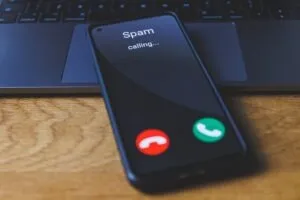
In today’s digital age, communication is key for businesses to thrive. Law firms, like any other business, heavily rely on phone communication to connect with clients, handle inquiries, and provide legal assistance. However, a growing concern for many law firms is the issue of their phone numbers being labeled as “spam” or “scam likely” by phone carriers and blocking apps.
This not only hampers effective communication but also tarnishes the firm’s reputation. So, why is your law firm’s number labeled as spam or scam likely? Find out here and contact Legal Conversion Center now to learn how our legal intake services could help your law firm.
Understanding Spam or Scam Likely Calls
A spam or scam likely call refers to an incoming phone call that is flagged by phone carriers or blocking apps as potentially fraudulent or unwanted. These calls are often associated with unsolicited telemarketing, phishing attempts, or scams aimed at obtaining personal or financial information from recipients. However, not all of these flagged calls are actually fraudulent.
Phone carriers and blocking apps use algorithms and databases to analyze call patterns, user feedback, and other factors to identify and block such calls. While not all flagged calls are necessarily malicious, the labeling helps users identify and avoid potential threats to their privacy and security.
Why Can a Phone Number Get Labeled as Spam?
Phone carriers and blocking apps employ various algorithms and databases to identify and block potential spam or scam calls. These systems analyze call patterns, user feedback, and other factors to determine the likelihood of a call being unwanted or fraudulent.
Unfortunately, legitimate businesses, including law firms, can sometimes get caught in the crossfire due to the nature of their operations. Let’s take a look at some of the reasons why your firm’s phone number may be getting flagged.
Common reasons for labeling include:
- High call volume: Law firms often make numerous outbound calls to clients, partners, and other parties. This high call volume can trigger spam detection algorithms, especially if the calls are made in quick succession or to a large number of recipients.
- Shared numbers: Some law firms use shared or virtual phone numbers, which may have been previously associated with spam or scam activities by other users. Even if the firm itself has a clean record, the history of the number can lead to it being flagged.
- Robocalling: Some law firms use automated calling systems for appointment reminders, follow-ups, or other purposes. While these systems are meant to streamline communication, they can be mistaken for robocalls by spam detection algorithms.
- Geographical discrepancies: Law firms often serve clients across different regions or states. If the firm’s phone number does not match the geographical location displayed on a caller ID, it may trigger suspicion and lead to labeling as spam.
The Impact on Law Firms
The consequences of having a law firm’s number labeled as spam or scam likely can be significant:
- Missed opportunities: Clients may ignore or block incoming calls from the firm, leading to missed opportunities for new cases or consultations.
- Reputation damage: Being labeled as a spam call or scam likely can damage the firm’s reputation and erode trust among existing and potential clients.
- Decreased efficiency: Law firm staff may waste time and resources dealing with technical issues related to phone communication rather than focusing on client matters.
Addressing the Issue
While the labeling of a law firm’s number as spam or scam likely can be frustrating, there are steps that can be taken to mitigate the problem:
- Number verification: Law firms should verify their phone numbers with phone carriers and ensure that they have a clean reputation. This may involve providing additional documentation or proof of legitimacy.
- Call analytics: Implementing call analytics software can help law firms monitor their call patterns and identify any issues that may trigger spam detection algorithms.
- Caller ID consistency: Ensuring that the caller ID information matches the firm’s registered address or location can help prevent suspicion and labeling as spam.
- Educating clients: Law firms can educate their clients about the issue and encourage them to whitelist the firm’s number to ensure that legitimate calls are not missed.
How Can Legal Conversion Center Help?
If your law firm is struggling with the issue of its number being labeled as spam or scam likely, Legal Conversion Center can provide assistance. Our team specializes in helping law firms improve their digital presence and communication strategies.
- Phone number solutions: We can assist in verifying and optimizing your law firm’s phone numbers to improve deliverability and reduce the risk of being labeled as spam.
- Call tracking and analytics: Our call tracking and analytics services can provide valuable insights into your firm’s call patterns and help identify and address any issues that may arise.
- Reputation management: We offer reputation management services to help law firms maintain a positive online reputation and address any negative feedback or labeling issues.
Contact Legal Conversion Center Now to Get Help With Your Law Firm’s Number
The issue of law firm numbers being labeled as spam or scam likely is a complex one, but it’s not insurmountable. By understanding the reasons behind the labeling and taking proactive steps to address the issue, law firms can ensure that their communication channels remain open and effective.
For personalized assistance and solutions tailored to your law firm’s needs, contact Legal Conversion Center today. Remember, effective communication is the cornerstone of success for any law firm. Don’t let spam labeling stand in your way–take action today.
